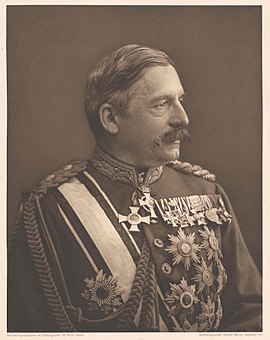|
Max von Hausen
Max Clemens Lothar Freiherr von Hausen (December 17, 1846 – March 19, 1922) was a German military officer during the First World War. He participated in the Austro-Prussian and Franco-German Wars and became Generaloberst of Saxon troops and War Minister in the Kingdom of Saxony. At the beginning of the First World War, he was the head of the Third Army which he led during the Battles of the Frontiers, Charleroi, and the Marne. He was relieved of his command because of illness in September 1914. LifeEarly lifeMax Clemens Lothar von Hausen was born on the 17th December 1846 in Dresden-Neustadt as the second son of Clemens von Hausen and Anna Wilhelmine von Ammon. His mother Anna was the daughter of the surgeon and opthalmologist Friedrich August von Ammon. Through his mother he was also a great-grandson of the protestant theologian Christoph Friedrich von Ammon by whom he was baptized.[1] Military careerComing from a military family Hausen entered the Saxon army as a cadet in the royal Saxon school of cadets. Being promoted to Seconde-Lieutenant in 1864 he joined the 3rd Jäger Battalion and served against Prussia in the Austro-Prussian War of 1866; where he saw action at the Battle of Königgrätz. After that war, Saxony allied with Prussia and became a part of the German Empire when it was created in 1871. From 1871 to 1874 Hausen taught at the Prussian military academy in Berlin and from 1875 until 1887 he served on the Imperial German General Staff. Being the chief of staff of the Saxon army from 1892 to 1895 he commanded the 32nd (3rd Royal Saxon) Division from 1897 to 1900 and the XII (1st Royal Saxon) Corps from 1900 to 1902. He served as Minister of War of the Kingdom of Saxony from 1902 to 1914, being promoted to Generaloberst in 1910. During Hausen's service year as Minister of War, he tried to have a good relationships with Prussian Army. In 1914, Hausen requested to be released from his more than 50 year service.[2][3] First World WarUpon mobilization in August 1914, the Royal Saxon Army became the German Third Army[4] and Hausen was given command. His army participated in the Battle of the Frontiers, mainly in the battles of Dinant, where Hausen's troops summarily executed over 600 of its inhabitants, including several women and children (one of them just 3 weeks old),[5][6] and Charleroi, and he and his army were responsible for the destruction of Reims in September 1914. When asked about how such deeds would eventually be known into history, he replied:
After the Second Army's retreat after the First Battle of the Marne, Hausen saw his own flank exposed and ordered a retreat. After the stabilization of the front on the Aisne River, on September 9, 1914, Hausen was relieved of his command due to illness and replaced by General Karl von Einem. Hausen held no further field commands during the war, and died shortly after the war ended. He was occupied by writing about his memories during his last years.[3] Dates of rank
Decorations and awards
NotesRegarding personal names: Freiherr is a former title (translated as 'Baron'). In Germany since 1919, it forms part of family names. The feminine forms are Freifrau and Freiin.
References
External links
|
||||||||||||||||||||||||||||||||||||
Portal di Ensiklopedia Dunia
